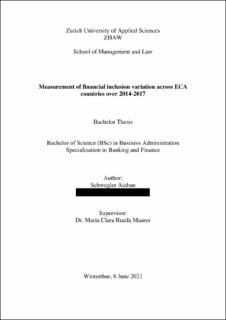Bitte benutzen Sie diese Kennung, um auf die Ressource zu verweisen:
https://doi.org/10.21256/zhaw-24366| Publikationstyp: | Thesis: Bachelor |
| Titel: | Measurement of financial inclusion variation across ECA countries over 2014-2017 |
| Autor/-in: | Schwegler, Aizhan |
| Betreuer/-in / Gutachter/-in: | Rueda Maurer, Maria Clara |
| DOI: | 10.21256/zhaw-24366 |
| Umfang: | 48 |
| Erscheinungsdatum: | 2021 |
| Verlag / Hrsg. Institution: | ZHAW Zürcher Hochschule für Angewandte Wissenschaften |
| Verlag / Hrsg. Institution: | Winterthur |
| Sprache: | Englisch |
| Fachgebiet (DDC): | 332: Finanzwirtschaft |
| Zusammenfassung: | The topic of financial inclusion is highly discussed among academics and practitioners because it is believed to promote economic and financial growth, reduce poverty, income inequality and improve social inclusion. Hence, it has become a primary agenda for many countries to stimulate higher financial inclusion. However, despite of its importance, many countries in ECA region are still behind in achieving their goals of deepening access to their financial system. Moreover, the advances in financial inclusion in ECA region were not consistent across member countries between 2014-2017. While earlier research has tended to focus on defining financial inclusion, its barriers and measuring its impact, few studies have investigated the reverse impact in ECA countries, i.e., what factors and to what extent impact its variation among countries. Therefore, the focus of this bachelor paper was to explain the variation in recent advances in financial inclusion across ECA countries. The objective is to understand which factors might explain the variation in the uneven growth of financial inclusion in ECA countries during 2014-2017. To analyze reasons contributing to the variations of financial inclusion, the paper used primarily quantitative methodology. In the first step, a financial inclusion index (FII) was calculated to arrive at a standardized metric for each of 48 countries over 2014-2017. This index integrates three important dimensions: access, quality, and usage of financial services. In the next step, the analysis used macroeconomic, socioeconomic, technological, and institutional variables to conduct analysis of descriptive statistics, correlation with financial inclusion index, and multiple regression analysis. Results of the analyses indicated that there is a strong positive correlation between the FII and GNI per capita, human development index, and internet usage. In contrast, inflation rate is negatively correlated with the FII. However, there is a relatively weak negative correlation of the FII and GDP growth rate. Additionally, such factors as unemployment, population growth and mobile phone use exhibit a weak positive association with the FII. Finally, the results of cross-country regression analysis indicated that macroeconomic and socioeconomic factors contribute significantly into variation of financial inclusion. Whereas institutional factors have only moderate effect and technological factors demonstrated the lowest impact on the advances of financial inclusion. In conclusion, the variation in financial inclusion can be explained to a greater extent by macroeconomic and socioeconomic factors, and to some extent by institutional characteristics and to a lesser extent by technological factors. The significance of this findings suggests the possible direction of policies implementation such as improving institutional governance, shaping better social inclusion, and increasing standards of living. Based on the conclusions, possible recommendations for future research would be to understand the impact of digital technology and literacy on the access to financial services. |
| URI: | https://digitalcollection.zhaw.ch/handle/11475/24366 |
| Lizenz (gemäss Verlagsvertrag): | CC BY-NC-ND 4.0: Namensnennung - Nicht kommerziell - Keine Bearbeitungen 4.0 International |
| Departement: | School of Management and Law |
| Enthalten in den Sammlungen: | BSc Betriebsökonomie |
Dateien zu dieser Ressource:
| Datei | Beschreibung | Größe | Format | |
|---|---|---|---|---|
| Thesis Aizhan Schwegler.pdf | 1.07 MB | Adobe PDF |  Öffnen/Anzeigen |
Zur Langanzeige
Schwegler, A. (2021). Measurement of financial inclusion variation across ECA countries over 2014-2017 [Bachelor’s thesis, ZHAW Zürcher Hochschule für Angewandte Wissenschaften]. https://doi.org/10.21256/zhaw-24366
Schwegler, A. (2021) Measurement of financial inclusion variation across ECA countries over 2014-2017. Bachelor’s thesis. ZHAW Zürcher Hochschule für Angewandte Wissenschaften. Available at: https://doi.org/10.21256/zhaw-24366.
A. Schwegler, “Measurement of financial inclusion variation across ECA countries over 2014-2017,” Bachelor’s thesis, ZHAW Zürcher Hochschule für Angewandte Wissenschaften, Winterthur, 2021. doi: 10.21256/zhaw-24366.
SCHWEGLER, Aizhan, 2021. Measurement of financial inclusion variation across ECA countries over 2014-2017. Bachelor’s thesis. Winterthur: ZHAW Zürcher Hochschule für Angewandte Wissenschaften
Schwegler, Aizhan. 2021. “Measurement of Financial Inclusion Variation across ECA Countries over 2014-2017.” Bachelor’s thesis, Winterthur: ZHAW Zürcher Hochschule für Angewandte Wissenschaften. https://doi.org/10.21256/zhaw-24366.
Schwegler, Aizhan. Measurement of Financial Inclusion Variation across ECA Countries over 2014-2017. ZHAW Zürcher Hochschule für Angewandte Wissenschaften, 2021, https://doi.org/10.21256/zhaw-24366.
Alle Ressourcen in diesem Repository sind urheberrechtlich geschützt, soweit nicht anderweitig angezeigt.